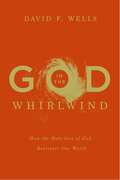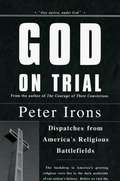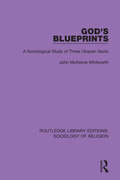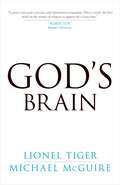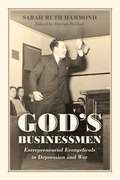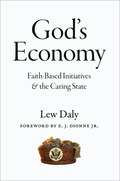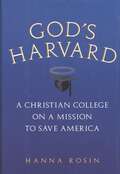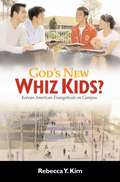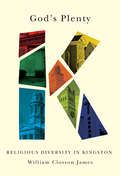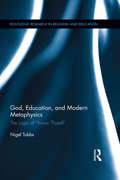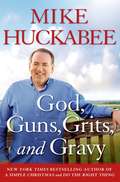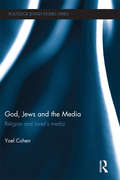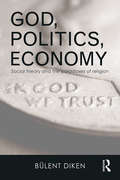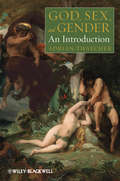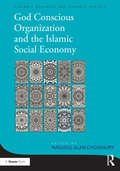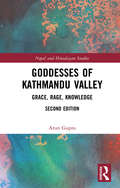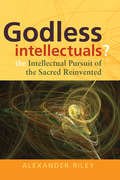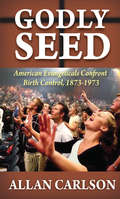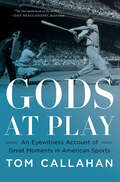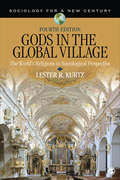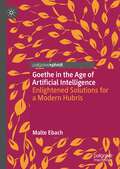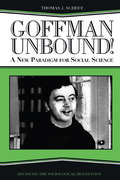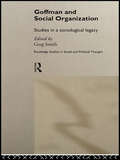- Table View
- List View
God in the Whirlwind: How the Holy-love of God Reorients Our World
by David F. WellsOffering a remedy for evangelicalism's superficial theology, Wells points readers to the paradox of God's "holy-love," exploring how the interplay of his characteristics reorient our lives and change the world.
God on Trial: Dispatches from America's Religious Battlefield
by Peter IronsThis is a well written book documenting six important cases concerning separation of church and state. They are all fairly recent cases, too. The first chapter contains a short history of America's lack of tolerance for religious difference, and shows why we need separation of church and state.
God's Blueprints: A Sociological Study of Three Utopian Sects (Routledge Library Editions: Sociology of Religion #4)
by John McKelvie WhitworthViewing the world with abhorrence, members of utopian sects isolate themselves from its influence. As this book, first published in 1975, shows, they seek to establish and promulgate radically distinctive forms of society according to what they claim to be God’s blueprint and which they believe are destined by his intervention and their example to spread throughout the world. Rooted in the sociology of religion and more particularly in the concepts of sectarianism and communitarianism, this study presents an analysis of three sects: the Shakers; the Oneida Community; and the Bruderhof. The author examines the origins, religious conceptions, social structure and composition, modes of social control, and development of each group; and in a concluding chapter he discusses the utopian sect as a distinctive social form.
God's Brain
by Lionel Tiger Michael McGuireIn the fractious debate on the existence of God and the nature of religion, two distinguished authors radically alter the discussion. Taking a perspective rooted in evolutionary biology with a focus on brain science, the authors elucidate the perennial questions about religion: What is its purpose? How did it arise? What is its source? Why does every known culture have some form of it? Their answer is deceptively simple, yet at the same time highly complex: The brain creates religion and its varied concepts of God, and then in turn feeds on its creation to satisfy innate neurological and associated social needs. Brain science reveals that humans and other primates alike are afflicted by unavoidable sources of stress that the authors describe as "brainpain." To cope with this affliction people seek to "brainsoothe." We humans use religion and its social structures to induce brainsoothing as a relief for innate anxiety. How we do this is the subject of this groundbreaking book. In a concise, lively, accessible, and witty style, the authors combine zoom-lens vignettes of religious practices with discussions of the latest research on religion's neurological effects on the brain. Among other topics, they consider religion's role in providing positive socialization, its seeming obsession with regulating sex, creating an afterlife, how religion's rules of behavior influence the law, the common biological scaffolding between nonhuman primates and humans and how this affects religion, a detailed look at brain chemistry and how it changes as a result of stress, and evidence that the palliative effects of religion on brain chemistry is not matched by nonreligious remedies. Concluding with a checklist offering readers a means to compute their own "brainsoothe score," this fascinating book provides key insights into the complexities of our brain and the role of religion, perhaps its most remarkable creation.
God's Businessmen: Entrepreneurial Evangelicals in Depression and War
by Darren Dochuk Sarah Ruth HammondThe evangelical embrace of conservatism is a familiar feature of the contemporary political landscape. What’s less well-known, however, is that the connection predates the Reagan revolution, going all the way back to the Depression and World War II. Evangelical businessmen at the time were quite active in opposing the New Deal—on both theological and economic grounds—and in doing so claimed a place alongside other conservatives in the public sphere. Like previous generations of devout laymen, they self-consciously merged their religious and business lives, financing and organizing evangelical causes with the kind of visionary pragmatism that they practiced in the boardroom. In God’s Businessmen, Sarah Ruth Hammond explores not only these men’s personal trajectories but also those of the service clubs and other institutions that, like them, believed that businessmen were God’s instrument for the Christianization of the world. Hammond presents a capacious portrait of the relationship between the evangelical business community and the New Deal—and in doing so makes important contributions to American religious history, business history, and the history of the American state.
God's Economy: Faith-based Initiatives and the Caring State
by Lew DalyPresident Obama has signaled a sharp break from many Bush Administration policies, but he remains committed to federal support for religious social service providers. Like George W. Bush's faith-based initiative, though, Obama's version of the policy has generated loud criticism--from both sides of the aisle--even as the communities that stand to benefit suffer through an ailing economy. God's Economy reveals that virtually all of the critics, as well as many supporters, have long misunderstood both the true implications of faith-based partnerships and their unique potential for advancing social justice. Unearthing the intellectual history of the faith-based initiative, Lew Daly locates its roots in the pluralist tradition of Europe's Christian democracies, in which the state shares sovereignty with social institutions. He argues that Catholic and Dutch Calvinist ideas played a crucial role in the evolution of this tradition, as churches across nineteenth-century Europe developed philosophical and legal defenses to protect their education and social programs against ascendant governments. Tracing the influence of this heritage on the past three decades of American social policy and church-state law, Daly finally untangles the radical beginnings of the faith-based initiative. In the process, he frees it from the narrow culture-war framework that has limited debate on the subject since Bush opened the White House Office for Faith-Based and Community Initiatives in 2001. A major contribution from an important new voice at the intersection of religion and politics, God's Economy points the way toward policy-making that combines strong social support with a new moral focus on the protection of families and communities.
God's Harvard: A Christian College on a Mission to Save America
by Hanna RosinSince 2000, America’s most ambitious young evangelicals have been making their way to Patrick Henry College, a small Christian school just outside the nation’s capital. Most of them are homeschoolers whose idealism and discipline put the average American teenager to shame. And God’s Harvard grooms these students to be the elite of tomorrow, dispatching them to the front lines of politics, entertainment, and science, to wage the battle to take back a godless nation. Hanna Rosin spent a year and a half embedded at the college, following the students from the campus to the White House, Congress, conservative think tanks, Hollywood, and other centers of influence. Her account captures this nerve center of the evangelical movement at a moment of maximum influence and also of crisis, as it struggles to avoid the temptations of modern life and still remake the world in its own image.
God's New Whiz Kids?: Korean American Evangelicals on Campus
by Rebecca Y. KimIn the past twenty years, many traditionally white campus religious groups have become Asian American. Today there are more than fifty evangelical Christian groups at UC Berkeley and UCLA alone, and 80% of their members are Asian American. At Harvard, Asian Americans constitute 70% of the Harvard Radcliffe Christian Fellowship, while at Yale, Campus Crusade for Christ is now 90% Asian. Stanford's Intervarsity Christian Fellowship has become almost entirely Asian.There has been little research, or even acknowledgment, of this striking development.God’s New Whiz Kids? focuses on second-generation Korean Americans, who make up the majority of Asian American evangelicals, and explores the factors that lead college-bound Korean American evangelicals—from integrated, mixed race neighborhoods—to create racially segregated religious communities on campus. Kim illuminates an emergent “made in the U.S.A.” ethnicity to help explain this trend, and to shed light on a group that may be changing the face of American evangelicalism.
God's Plenty: Religious Diversity in Kingston
by William Closson JamesGod's Plenty examines the religious landscape of Kingston, Ontario, in the twenty-first century. The rich religious life of Kingston - a mid-sized city with a strong sense of its history and its status as a university town - is revealed in a narrative that integrates material from sociological and historical studies, websites, interviews, religious and literary scholarship, and personal experience. In Kingston, as in every Canadian city, downtown parishes and congregations have dwindled, disappeared, or moved to the suburbs. Attendance at mainline churches - and their political authority - has declined. Ethnic diversity has increased within Christian churches, while religious communities beyond Christianity and Judaism have grown. Faith groups have split along liberal and conservative lines, and the number of those claiming to have no religion - or to be spiritual but not religious - has increased. Yet amidst all this, religion continues to be evident in institutions and public life and important to the lives of many Canadians. God's Plenty, a ground-breaking contribution to the study of religion in Canada and a model for future community-based research, is the first overview of the religious topography of a Canadian city, telling the story of various faith communities and adding to the study of religious diversity and multiculturalism.
God, Education, and Modern Metaphysics: The Logic of "Know Thyself" (Routledge Research in Religion and Education)
by Nigel TubbsThe Western tradition has long held the view that while it is possible to know that God exists, it nevertheless remains impossible to know what God is. The ineffability of the monotheistic God extends to each of the Abrahamic faiths. In this volume, Tubbs considers Aristotle’s logic of mastery and questions the assumptions upon which God’s ineffability rests. Part I explores the tensions between the philosophical definition of the One as "thought thinking itself" (the Aristotelian concept of noesis noeseos) and the educational vocation of the individual as "know thyself" (gnothi seuton). Identifying vulnerabilities in the logic of mastery, Tubbs puts forth an original logic of education, which he calls modern metaphysics, or a logic of learning and education. Part II explores this new educational logic of the divine as a "logic of tears," as a "dreadful religious teacher," and as a way to cohere the three Abrahamic faiths in an educational concept of monotheism.
God, Guns, Grits, And Gravy
by Mike HuckabeeThe New York Times Bestseller!<P><P> In God, Guns, Grits and Gravy, Mike Huckabee asks, "Have I been taken to a different planet than the one on which I grew up?" The New York Times bestselling author explores today's fractious American culture, where divisions of class, race, politics, religion, gender, age, and other fault lines make polite conversation dicey, if not downright dangerous. As Huckabee notes, the differences of opinion between the "Bubble-villes" of the big power centers and the "Bubba-villes" where most people live are profound, provocative, and sometimes pretty funny. Where else but in Washington, D.C. could two presidential golf outings cost the American taxpayers $2.9 million in travel expenses?<P> Government bailouts, politician pig-outs, and popular culture provocations from Jay-Z and Beyoncé to Honey Boo-Boo to the Duck Dynasty's Robertson family. Gun rights, gay marriage, the decline of patriotism, and the mainstream media's contempt for those who cherish a faith-based life. The trouble with Democrats, the even bigger trouble with Republicans, our national security complex, and how our Constitution is eroding under our noses. Stories of everyday Americans surviving tough times, reflections on our way of life as it once was, as it is, and as it might become…these subjects and many more are covered with Mike Huckabee's signature wit, insight, and honesty.<P> At times lighthearted, at others bracingly realistic, Huckabee's brand of optimistic patriotism highlights American ideals, offering a bright outlook for future generations.<P> With a wry eye for the ridiculous and a clear-eyed look at the most controversial issues of our time, God, Guns, Grits and Gravy is Mike Huckabee at his very best.
God, Jews and the Media: Religion and Israel’s Media (Routledge Jewish Studies Series)
by Yoel CohenIn order to understand contemporary Jewish identity in the twenty-first century, one needs to look beyond the Synagogue, the holy days and Jewish customs and law to explore such modern phenomena as mass media and their impact upon Jewish existence. This book delves into the complex relationship between Judaism and the mass media to provide a comprehensive examination of modern Jewish identity in the information age. Covering Israel as well as the Diaspora populations of the US and UK, the author looks at journalism, broadcasting, advertising and the internet to give a wide-ranging analysis of how the Jewish religion and Jewish people have been influenced by the media age. He tackles questions such as: What is the impact of Judaism on mass media? How is the religion covered in the secular Israeli media? Does the coverage strengthen religious identity? What impact does the media have upon secular-religious tensions? Chapters explore how the impact of Judaism is to be found particularly in the religious media in Israel – haredi and modern Orthodox – and looks at the evolution of new patterns of religious advertising, the growth and impact of the internet on Jewish identity, and the very legitimacy of certain media in the eyes of religious leaders. Also examined are such themes as the marketing of rabbis, the `Holyland’ dimension in foreign media reporting from Israel, and the media’s role in the Jewish Diaspora. An important addition to the existing literature on the nature of Jewish identity in the modern world, this book will be of great interest to scholars of media studies, media and religion, sociology, Jewish studies, religion and politics, as well as to the broader Jewish and Israeli communities.
God, Politics, Economy: Social Theory and the Paradoxes of Religion (Routledge Advances in Sociology)
by Bulent DikenThe book intervenes into the contemporary debate on religion, politics, and economy, focusing on the field of formation which emerges as these seemingly autonomous spheres encounter one another. Empirically, it concentrates on examples from literature, theatre, and cinema as well as a case study of the recent revolts in Turkey where a ‘moderate’ Islamic government is in power. Theoretically, its focus is on the contemporary ‘return’ of religion in the horizon of the critique of religion, seeking to articulate an affirmative politics that can re-evaluate the value of dominant values in religious governance and governance of religion.
God, Sex, and Gender: An Introduction
by Adrian ThatcherEngagingly and clearly written by a highly respected theologian, God, Sex, and Gender is the first comprehensive introduction to a theology of both sexuality and gender available in a single volume. Makes a theological contribution to understanding the unprecedented changes in sexual and gender relationships of the last fifty years Discusses many topics including: sexual difference; sexual equality; gender and power; the nature of desire; the future of marriage in Christian sexual ethics; homosexuality and same-sex unions; the problems of sexual minorities; contraception in a time of HIV/AIDS; the separation of sexual experience from marriage; and offers new arguments for marriage and for chastity Offers a consistent and engaging introduction at the cutting edge of theological inquiry, which is contemporary, undogmatic, questioning, and relevant to readers' experience, interests, and needs Written lucidly and engagingly by an established and respected academic who has published widely in this area
God-Conscious Organization and the Islamic Social Economy (Islamic Business and Finance Series)
by Masudul Alam ChoudhuryCan there be God-conscious organizational behaviour in the real world of today’s capitalist corporations and the alternatives? In this overview of God-consciousness as a moral-awareness model of preference formation, functions, structures, and programs of organization within the purview of institutions and society, the authors explain and compare the major ethical issues of organizational behaviour and structure in Islamic economic theory and application. By analysing the nature of inclusive organizations and institutions, and the ethical preferences in Islamic choice framework, the authors from Saudi Arabia, Australia, Malaysia, Bangladesh, Canada, Indonesia and the UK, can highlight individual aspects to show whether capitalist organizational behaviour is sustainable. They describe how The Tawhidi epistemological framework governing conscious moral decision-making by institutions and organization, are used to establish the meaning and potential application of the concept of sustainability, and whether organizational moral objectives achieve their goals of life-fulfilment development, Poverty alleviation and the equitable distribution of wealth and resources.
Goddesses of Kathmandu Valley: Grace, Rage, Knowledge (Nepal and Himalayan Studies)
by Arun GuptoIn South Asia goddesses are conceptualized and worshipped in a fascinatingrange of forms – from cosmic beings to bacterial manifestations, from human-like appearances to creatures with animal and insect semblances. This book maps the diverse identities of goddesses through metaphors of Grace, Rage and Knowledge, and offers an in-depth insight into femininity, sexual politics, ritual worship, religion, ecology and gender. The volume explores how these deity attributes are expressed and embedded through anthropomorphic as well as inorganic forms of nature: beautiful women, multi-legged and many-armed animals, epistemic selves, demonic beings, glamorous personifications and also grotesque sub-humans. The second edition contains an Epilogue which further explores how the discourses on Goddesses are moulded by the myth and folklore. It opens discussions on how the dynamism of Goddess cultures have been appropriated into contemporary variations of those archetypes over time. This book will be useful to scholars and researchers of religious studies, cultural studies, folklore, art, literature, sociology and gender studies, especially those interested in Nepal and Hinduism.
Godless Intellectuals?: The Intellectual Pursuit of the Sacred Reinvented (Berghahn Ser.)
by Alexander Tristan RileyThe Durkheimians have traditionally been understood as positivist, secular thinkers, fully within the Enlightenment project of limitless reason and progress. In a radical revision of this view, this book persuasively argues that the core members of the Durkheimian circle (Durkheim himself, Marcel Mauss, Henri Hubert and Robert Hertz) are significantly more complicated than this. Through his extensive analysis of large volumes of correspondence as well as historical and macro-sociological mappings of the intellectual and social worlds in which the Durkheimian project emerged, the author shows the Durkheimian project to have constituted a quasi-religious quest in ways much deeper than most interpreters have thought. Their fascination, both personal and intellectual, with the sacred is the basis on which the author reconstructs some important components of modern French intellectual history, connecting Durkheimian thought to key representatives of French poststructuralism and postmodernism: Bataille, Foucault, Derrida, Baudrillard, and Deleuze.
Godly Seed: American Evangelicals Confront Birth Control, 1873-1973
by Allan C. CarlsonInterview with Allan Carlson In an ironic twist, American evangelical leaders are joining mainstream acceptance of contraception. Godly Seed: American Evangelicals Confront Birth Control, 1873-1973, examines how mid-twentieth-century evangelical leaders eventually followed the mainstream into a quiet embrace of contraception, complemented by a brief acceptance of abortion. It places this change within the context of historic Christian teaching regarding birth control, including its origins in the early church and the shift in arguments made by the Reformers of the sixteenth century. The book explores the demographic effects of this transition and asks: did the delay by American evangelicals leaders in accepting birth control have consequences?At the same time, many American evangelicals are rethinking their acceptance of birth control even as a majority of the nation's Roman Catholics are rejecting their church's teaching on the practice. Raised within a religious movement that has almost uniformly condemned abortion, many young evangelicals have begun to ask whether abortion can be neatly isolated from the issue of contraception. A significant number of evangelical families have, over the last several decades, rejected the use of birth control and returned decisions regarding family size to God. Given the growth of the evangelical movement, this pioneering work will have a large-scale impact.
Gods at Play: An Eyewitness Account
by Tom CallahanA beautifully observed narrative of American sport: character, grit, tragedy, unremarked heroism, and, always, the illuminating story behind the story. As a columnist for Time magazine, among many other publications, Tom Callahan witnessed an extraordinary number of defining moments in American sport across four decades. He takes us from Roberto Clemente clinching his 3,000th, and final, regular-season hit in Pittsburgh; to ringside for the Muhammad Ali–George Foreman fight in Zaire; and to Arthur Ashe announcing, at a news conference, that he’d tested positive for HIV. There are also little-known private moments: Joe Morgan whispering thank you to a virtually blind Jackie Robinson on the field at the 1972 World Series, or Kareem Abdul-Jabbar saying he was more interested in being a good man than in being the greatest basketball player. Brimming with colorful vignettes and enlivened by Callahan’s eye for detail, Gods at Play offers surprising portraits of the most celebrated names in sports. Roger Rosenblatt calls Callahan “the most complete sportswriter in America. He knows the most and writes the best."
Gods in the Global Village: The World's Religions in Sociological Perspective (Sociology for a New Century Series)
by Lester R. KurtzIn a world plagued by religious conflict, how can the various religious and secular traditions coexist peacefully on the planet? And, what role does sociology play in helping us understand the state of religious life in a globalizing world? In the Fourth Edition ofGods in the Global Village, author Lester Kurtz continues to address these questions. This text is an engaging, thought-provoking examination of the relationships among the major faith traditions that inform the thinking and ethical standards of most people in the emerging global social order. Thoroughly updated to reflect recent events, the book discusses the role of religion in our daily lives and global politics, and the ways in which religion is both an agent of, and barrier to, social change.
Gods in the Global Village: The World's Religions in Sociological Perspective (Sociology for a New Century Series)
by Lester R. KurtzIn a world plagued by religious conflict, how can the various religious and secular traditions coexist peacefully on the planet? And, what role does sociology play in helping us understand the state of religious life in a globalizing world? In the Fourth Edition ofGods in the Global Village, author Lester Kurtz continues to address these questions. This text is an engaging, thought-provoking examination of the relationships among the major faith traditions that inform the thinking and ethical standards of most people in the emerging global social order. Thoroughly updated to reflect recent events, the book discusses the role of religion in our daily lives and global politics, and the ways in which religion is both an agent of, and barrier to, social change.
Goethe in the Age of Artificial Intelligence: Enlightened Solutions for a Modern Hubris
by Malte EbachInside you lies a precise scientific instrument – the ability to observe Nature and recall past experiences. You were born with it and you use it every day. You can be trained to use it more effectively to, for example, compare and discover new species of organisms or new minerals. Our senses do have limitations, and we often use microscopes, telescopes and other tools to aid our observation. However, we benefit from knowing their limitations and the impact they have on our ability to combine our observations and our experience to make decisions. Once these tools replace our direct observation and our experience we ourselves become disconnected from Nature. Scientific practice turns into well-meant opinions out-weighing empirical evidence. This is happening now in the current age of big data and artificial intelligence. The author calls this the Modern Hubris and it is slowly corroding science. To combat the Modern Hubris and to reconnect with Nature, scientists need to change the way they practise observation. To do so may require the scientist to transform themself. One person who successfully did this was Johann Wolfgang von Goethe. His journey demonstrates how one man attempted to take on the Modern Hubris by transforming his life and how he saw Nature. Following Goethe’s transformation teaches us how we can also reconnect ourselves with Nature and Natural science.
Goffman Unbound!: A New Paradigm for Social Science
by Harold Kincaid Thomas J. Scheff Bernard S Phillips"Thomas Scheff demonstrates why Goffman remains such a key figure for social scientists. Goffman may have been cautious about recognizing the role of emotions in social life, but Scheff boldly and creatively shows why the sociological and the psychological are necessarily intertwined. This is certainly a book for all serious analysts of social behaviour." Michael Billig, Nottingham University "Scheff's critical eye is equal to his subject, shrewdly appreciating Goffman's many virtues while also showing where and how Goffman's thinking needs revision and development. This original and provocative book offers a fresh interpretation of Goffman and will become a benchmark for all subsequent commentary." Greg Smith, University of Salford One of the seminal sociologists of the twentieth century, Erving Goffman revolutionized our understanding of the microworld of emotions and relationships. We all live in this world every day of our lives, yet it is virtually invisible to us. Goffman's genius was to recognize and describe this world as no one had before. The book synthesizes prior scholarly commentary on Goffman's work, and includes biographical material from his life, untangling some of the many puzzles in Goffman's work and life. Scheff also proposes ways of filling gaps and false starts. One chapter explores the meaning of the emotion of love, another of hatred. These and other new directions could facilitate the creation of a microsocial science that unveils the emotional/relational world.
Goffman and Social Organization: Studies of a Sociological Legacy (Routledge Studies in Social and Political Thought #Vol. 17)
by Greg SmithErving Goffman is considered by many to have been one of the most important sociologists of the post-war era. His close observation of everyday life and his concern with the ways in which people play roles and manage the impressions they present to each other led to his pioneering creation of a new dramaturgical perspective for sociology. His later analysis explored the field of deviance and many of his works in this area are now considered as sociological classics, including Asylums, The Presentation of the Self in Everyday Life and Stigma. This collection brings together many of today's leading sociologists to pursue and build upon the diverse aspects of Goffman's legacy.The contributors present chapters on key topics of Goffman's work. Issues covered include:* mental illness and institutionalism* the incorporation of literary intertexts in Goffman's writings* Goffman's relationship to ethnomethodology* the singularity of Goffman's ethnographyRanging from his critique of institutionalization to his understanding of the minute details of face-to-face interaction, this collection reveals the richness of Goffman's own work as well as his contribution to sociology today and will be essential reading for students and academics alike.
Gogoetak: Hiritarren eta estatu gizonaren brebiarioa
by Charles Louis de Secondat Felipe Juaristi GaldosZoriona edo zorigaitza, on edo gaitz ote den, barne-organoak nolakoak diren. Onean, istripuek, aberastasunek, ohoreek, osasun-kontuek, gaixotasunek ematen edo kentzen dute zoriona. Haatik, gaitzean, istripuek luzatzen edo laburtzen dute zorigaitza. Zorionaz edo zorigaitzaz mintzatzen garenean, tronpatu egiten gara beti; egoerak aztertzen baititugu, eta ez gizonak. Egoeraren bat ez da sekula zorigaiztokoa izango, baldin eta gustukoa bada; eta, esaten dugunean gizon bat, halako egoeraren batean egonik, zorigaiztokoa dela, ez dugu esan nahi gu ere, dauzkagun organoak edukirik, zorigabekoak izango ginatekeenik haren tokian bageunde. Gogoetak
